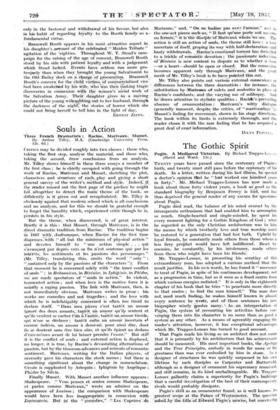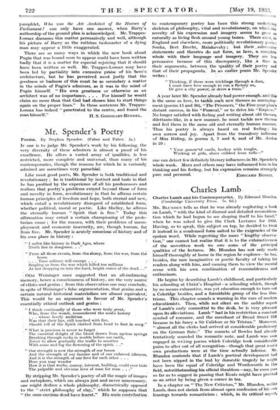The Gothic Spirit
Pugin. A Mediaeval Victorian. By Michael Trappes-Lo,r.:-.x. (Sheed and Ward. 15s.) Pugin. A Mediaeval Victorian. By Michael Trappes-Lo,r.:-.x. (Sheed and Ward. 15s.)
TWENTY years have passed since the centenary of -Pagin's birth, and twenty must still pass before the centenary of his death. In a letter, written during=hiS lase Wass, he quoted a doctors opinion. mat he "-had worked one himdred years
in forty.".- Mr. Michael Trappes-tOmax has now made a book about those forty violent years, a book as good as the standard biography by Benjamin Ferrey is had, -and has thus deprived the general reader of any excuse for ignorance about Pugin.
Pugin died mad, the balance of his mind overset by the
intemperate enthusiasm that had enabled him to accomplish so much. Single-hearted and single-minded, he spent his every moment fighting for a Gothic Kingdom of God ; what he regarded as the only Christian architecture was to him the means by which brotherly love and true worship must 'berestored to a generation that had Mat' both. Upheld by loyal friends, he Constantly:made others from those whom a less fiery prophet would have -left indifferent. Beset by enemies, he Condantly, by his intolerance, made others from those who might have been his friends:"
Mr. Trappes-Loniax, in presenting his scrutiny of this
extraordinary man, has adopted a curious method that the result justifies. In his own words, he has found it " necessary to treat of Pugin, in spite of his continuous development, not as a progression in time, but as it were as a fixed centre from which various energies radiated." It is only in the eighteenth chapter of his book that he tries " to penetrate more directly to that centre ; to find the man himself." The man does not need much finding, he makes. himself known in almost every sentence he wrege, and of(these sentences his new biographer wisely vuotes many. As_ an interpretation_ of Pugin, the system of recounting his activities before con- verging them into his. character is no more than as good a systenis as any other. As a means of agreeably engaging the reader's attention, however, it has exceptional advantages which Mr. 'Frappes-Lomax has turned to good account.
That Pugin made his living as an architect does not mean that it is primarily by his architecture that his achievement should be measured. His most important books, the Apology and the True Principles, embody in words far more of his greatness than was ever embodied by him in stone. As a designer of structures he was quickly surpassed in his own lifetime by such disciples as Carpenter and Butterfield, although as a designer of ornament his supremacy remained, and still remains, in its kind unchallengeable. Mr. 'Frappes- Lomax gallantly claiiiis a superiority for Pugin's buildings that a careful investigation of the best of their contemporary rivals would probably dissipate.
Pugin's skill as an ornamenter found, as is well known, its -greatest" scope-at the Palace' of 'Westminster. The question Sawaritriigini nowise, but convincing pamphlet, Who was the Art Architect of the Houses of A'arliantent can only have one answer, when Birry's authorship of the ground plan is acknowledged. Mr. Trappe_s- Lomax discusses this matter persuasively and well, although his picture of Barry as the ruthless taskmaster of a dying man may appear a little exaggerated.
There are so many ways in which the new book about Pugin that was bound soon to appear could have been written badly that it is a matter for especial rejoicing that it should have been written so well. Mr. Trappes-Lomax may have been led by partiality into excessive praise 'of' his 'hero's' architecture, but he has perceived most justly that the goodness or badness of this must be as secondary a matter in the minds of Pugin's admirers, as it was in the mind of Pugin himselE " His own greatness or otherwise as an architect was of no importance. . . . For himself he would claim no more than that God had chosen him to start things again on the proper lines." In those sentences Mr. Trappes- Lomax has indeed " penetrated to the centre, and found the















































 Previous page
Previous page